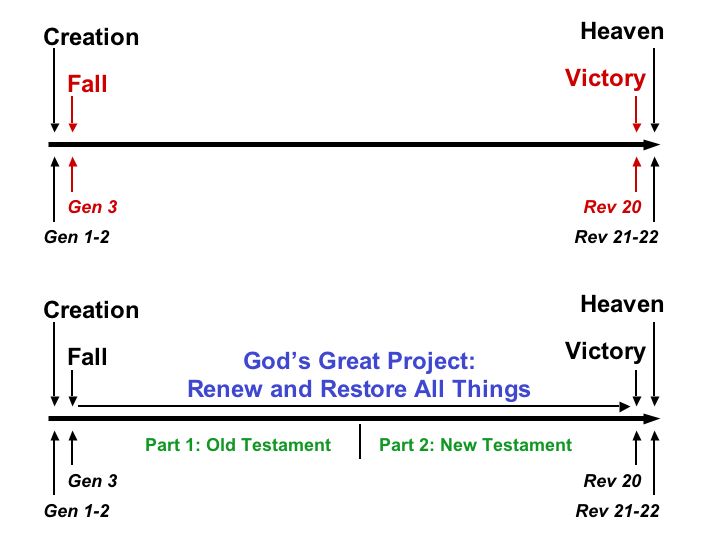
One Great Story
The One Great Story™
The Bible tells One Great Story: the story of God's first making, then redeeming and restoring the world that he made; the story of God's rescuing, forgiving and restoring a relationship with us his creatures. Only in the first two chapters of the Bible (Genesis 1-2) and last two chapters of the Bible (Revelation 21-22) is everything as God made it to be. Genesis 3 tells how sin entered the world and spoiled the perfect world God had made (Genesis 1:31). Not until Revelation 20 is evil is finally and forever removed.
God made us in his image so that we might know him and govern his world on his behalf (Genesis 1:27-28). Our sin ruptured our relationship with God (Genesis 3:10), put us at odds with one another (Genesis 3:12; 4:8), destroyed our own self-understanding as image-bearers of the God we no longer knew (Romans 1:18-32) and condemned the whole creation to frustration (Romans 8:19-21).

The rest of the Bible, from Genesis 3 to Revelation 20, is about God's great project of restoration and renewal. The Bible tells us what God has done and what God will yet do to repair the damage our sin has caused and make all things once again as good as new. That is the One Great Story of the Bible.
That story unfolds in two parts: the Old Testament and the New Testament. These are not two stories, but two integral parts of one and the same story. At every point, the New Testament presupposes the Old. Essential New Testament terms and concepts--Christ, Lord, Son of God, servant, kingdom, righteousness, sacrifice--cannot really be understood apart from the Old Testament. In a similar way, the Old Testament anticipates and finds its fulfillment in the New. Reading the Old Testament without the New is like leaving a play at intermission or quitting a novel two-thirds of the way through.
The central idea of the One Great Story* is this:
I will be your God and you will be my people.
The Bible is fundamentally about a relationship. And at its heart is a promise, "I will be your God and you will be my people," that occurs repeatedly throughout the Bible (see, for example, Genesis 17:7-8; Leviticus 26:12; Jeremiah 31:33; Revelation 21:3). It is the promise of a restored relationship with God. It comes at God's initiative. It will come about only as God conquers our unruly and fickle affections. God promises his love, care and faithfulness. He promises protection from our enemies and provision for our needs. In return, God requires our allegiance, loyalty and obedience.
And this means the restoration of all things. If the whole creation was damaged by our sin, our restoration as image-bearers once again in a relationship with God and under his authority is the key to creationÕs being made whole. Paul says that the whole creation is eagerly awaiting the time when we will put back right, because then the whole creation will be right as well (Romans 8:19-21).
Read more about the One Great Story.
- Recurring themes summarize the Bible's message.
- An historical overview helps keep the story straight.
To find out more about a workshop that will help you understand the
* Scholars have made many suggestions for "the" central theme of the Bible. Many of these other proposals are important biblical themes, but perhaps not as central as this one.